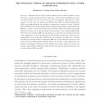Free Online Productivity Tools
i2Speak
i2Symbol
i2OCR
iTex2Img
iWeb2Print
iWeb2Shot
i2Type
iPdf2Split
iPdf2Merge
i2Bopomofo
i2Arabic
i2Style
i2Image
i2PDF
iLatex2Rtf
Sci2ools
MANSCI
2007
2007
The Strategic Perils of Delayed Differentiation
Postponement or delayed product differentiation has been identified as a key strategy to manage increasing demand uncertainty. The benefits of postponement arise out of the ability of a firm to pool demand and the associated risks from its various markets. In this study, we model early differentiation (ED) or delayed differentiation (DD) as a strategic choice for a firm selling in an imperfectly competitive market. Typically, delayed differentiation involves greater product design, process design and production cost. However, in order to throw the spotlight on the strategic effects of the choice of business process, we assume that all cost parameters are identical for a firm employing ED or DD. We find that the benefits of DD from risk pooling are reduced due to strategic interactions under competition. In fact, we show that under plausible conditions (i) when one firm employs ED and the other DD, the ED firm may outperform the DD firm; (ii) When the choice of business p...
| Added | 16 Dec 2010 |
| Updated | 16 Dec 2010 |
| Type | Journal |
| Year | 2007 |
| Where | MANSCI |
| Authors | Krishnan S. Anand, Karan Girotra |
Comments (0)

